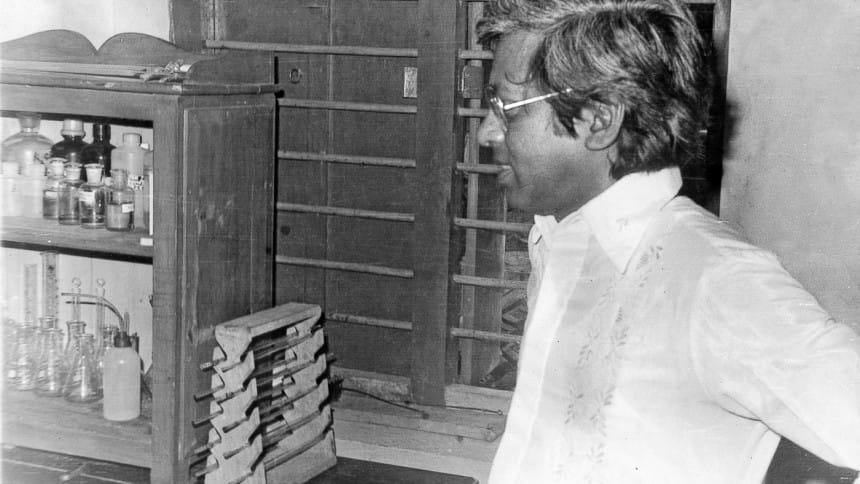Silent revolution to save lives

Sir Fazle Hasan Abed worked throughout his life and never spoke an unnecessary word. He was reluctant to talk about himself in particular. In fact, he was not interested to talk about Brac either as that would require him to speak about himself.
He worked persistently not because he wanted to make Brac the world’s largest NGO but because he found joy in what he did.
Abed’s education, family, his campaign for Bangladesh during the Liberation War, and how Brac developed have been discussed time and again but a few of his contributions have not been duly highlighted.
His aim to help the poor was evident even back in 1979, when he saw that the child mortality rate and birth rate were both quite high in Bangladesh. He knew that the population needed to be controlled and child mortality rates curbed.
The primary cause of the deaths was diarrhoea. And so, Brac took up the oral saline project.
In 1968, icddr,b invented the oral saline formula (with salt, glucose and potassium). But people in this country, particularly from lower-income groups had not heard about it.
Brac and icddr,b began working together to make oral saline accessible to all the people of the country. But the packaged remedy did not immediately solve the crisis. The question of how people in rural areas could access it even at night arose.
That was when a friend of Abed’s, icddr,b’s Dr Lincoln Chen, suggested that Abed start a project in which volunteers would go door-to-door and show people how oral saline could be easily prepared at home with salt and jaggery. The process was simple and there was no other way to make people derive the benefits, he had suggested.
As an institution, Brac has the capability to curb child mortality rates, Lincoln told Abed.
Initially Brac covered 20,000 homes under Sylhet’s Shalla police station.
Trainings were given to make more volunteers in the villages. The process to take oral saline to peoples’ doorsteps kick-started, but Brac faced numerous obstacles throughout the journey.
Abed had said, “Our volunteers were teaching only the women. We realised that targeting only women would not work. In order to make oral saline credible we needed to raise awareness among men as well. Traditionally, families in our country function on men’s orders. The project was not seeing success because the men were not realising the benefits of saline… So now it was our duty to make them understand that diarrhoea could be cured if saline was fed. Women needed to learn the recipe but men needed to have faith in it.
I arranged workshops in villages where the male members of the families would be brought and given lectures for two hours. Such workshops were held at market places too. I observed that everyone was paying attention. They were asking questions and were also satisfied with the answers.
Even Imams were involved in the process. We used to speak about the benefits of oral saline in mosques after Jum’a prayers. We wanted to make men understand anyhow. Our volunteers started going to markets, mosques, temples, everywhere! Gradually, villages started trusting oral saline.”
This is how the saline spread across the country and it took Brac 10 years to do it. The whole country knows that the campaign was a successful one. Brac took the initiative to a few African countries as well, despite adversities.
The NGO had successfully carried out campaigns on vaccination and TB as well. Even in those cases, they handled hurdles smartly.
Abed wanted to make the poor self-reliant and, in order to do that, he focused on poultry. Deaths of chickens and geese due to different diseases was a common phenomenon in villages. People would incur losses if they didn’t prevent that from happening and the only solution was giving vaccines.
He said, “We are learning something every day in the process of working with the poor. Unprecedented problems are popping up but they are being solved. How will vaccines be carried from the livestock officer’s office at night, how will they be preserved throughout the night… we had to sort it all out. Ripe bananas are cold. They work as insulators. We put the vaccine tubes inside bananas and carried them. The method turned out to be fruitful. The vaccines were not getting damaged.
The vaccines were kept inside bananas at night and given to chickens early in the morning. We initially covered 200 villages in Manikganj. Two hundred women were made vaccinators through trainings and they were taught about the different diseases that frequently hit chickens. We set a routine for them based on the seasons of the diseases and the vaccines were provided in each village twice a month.”

 For all latest news, follow The Daily Star's Google News channel.
For all latest news, follow The Daily Star's Google News channel. 



Comments